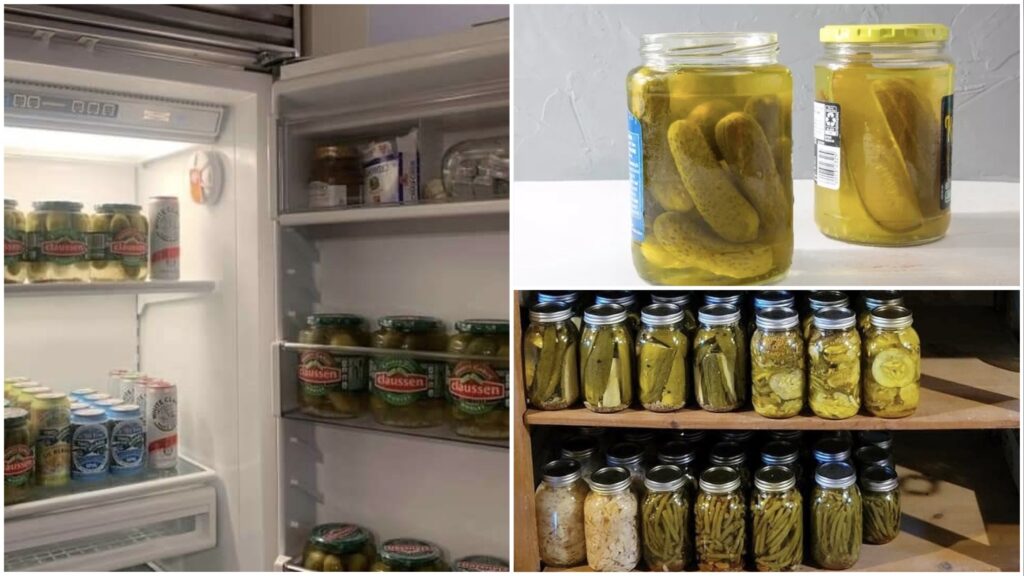A teenager once popped open a dusty jar of pickles he found during a kitchen cleanup, only to spend the next 12 hours regretting that crunchy bite. His mistake? Trusting how it looked instead of knowing the real signs of spoilage.
So, let’s not dance around it. Do pickles go bad? Oh, absolutely. Not quickly, but they do. Thanks to their salty, vinegary brine, pickles have a long shelf life compared to most foods.
That said, they’re not invincible. So, before you take a bite out of that old jar you rediscovered in your fridge, it’s smart to know the signs of spoilage and how to keep pickles fresher longer. This article breaks it all down clearly.
Slimy pickles or brine that looks separated or discolored also scream ‘expired pickles safety alert.
How Long Do Pickles Last and When Should You Worry?
If you’ve ever stared at a jar thinking, “Do pickles go bad?” you’re not alone. Generally, pickles can last up to 1–2 years unopened when stored in a cool pantry.
Once opened and refrigerated, you can expect to enjoy about 1–3 months of great quality, although some may last much longer if the brine remains intact.
Keep an eye on the “best by” date, but remember it’s not the final word. Use your senses—sight, smell, and taste—to really know when to toss them.
Signs Pickles Are Spoiled
A few red flags can tell you it’s time to toss those pickles. First, look for cloudiness in the brine (though this can be harmless in fermented types), mold on the surface, or a bloated lid. These are clear signs of pickle spoilage.
If you open the jar and get a funky, unpleasant odor (not the usual tangy one), don’t taste it. Slimy pickles or brine that looks separated or discolored also scream “expired pickles safety alert.” When in doubt, throw it out.
Can You Eat Old Pickles That Look Fine?
You can eat old pickles if they pass the sight, smell, and taste tests, but always with caution.
Just because something “looks” okay doesn’t mean bacteria aren’t lurking. Over time, even in vinegar, the acidity can decrease, giving bad microbes a chance to grow. If the pickles have been opened for months and taste off or the brine seems weak, it’s best not to risk it.
When food expiration is unclear, it’s safer to skip that bite.
Pickle Shelf Life: Fridge vs. Pantry Storage Matters
Pickle shelf life largely depends on how and where they’re stored.
The expiration of unopened pickles is longer when stored in a cool, dark pantry or cupboard—avoid storing them in sunlight or heat. Once opened, pickles should be stored in the fridge, submerged in their brine.
The cold slows down spoilage. Pantry-stored jars should only be used if they’re still sealed. For opened jars, refrigerate immediately and never leave them on the counter overnight, especially not in warm climates.
How To Store Pickles Properly for Maximum Crunch
Storing pickles isn’t rocket science, but it does make a huge difference in how long they last. Always use a clean utensil—no double-dipping. Ensure the lid is tightly sealed after every use.
The brine should always cover pickles; otherwise, they’ll dry out or develop mold. If you’re using homemade pickles, label the date clearly. And remember, no thawing if you ever freeze them; freezing ruins their texture completely. Your best bet? Fridge, brine, and common sense.
Pickles are meant to be delicious, not dangerous.
Fridge Pickles vs. Pantry Pickles. What’s the Deal?
Pantry pickles, that is, the pasteurized, store-bought kind, can go the distance unopened. Sometimes well past a year. Fridge pickles, on the other hand, are usually fresher, but they don’t have heat treatment behind them, so once opened, they’re a bit more fragile.
The secret to keeping either kind crisp and safe is to keep them cold once opened. That chill slows down spoilage and locks in the crunch.
That Juice Is More Than Just Pickle Perfume
That vinegary liquid? It’s doing a lot of heavy lifting. Pickle juice preserves, protects, and even adds flavor.
But if it starts smelling like yeast or something sour in a not-so-good way, or you spot strange floaty bits that aren’t garlic or peppercorns, it’s time to toss the jar.
Some folks reuse pickle juice to marinate veggies or flavor dressings, but don’t recycle old or questionable brine. It’s not worth the experiment.
Spoilage Doesn’t Always Leave a Clue
Sometimes, bad pickles are sneaky. No mold, no smell, but the jar’s been open forever. That’s a problem.
Even if they look normal, bacteria might be growing, especially if you’ve dipped a spoon in there after eating. Or left it out. Or didn’t tighten the lid. And if you can’t remember when you opened it? Just let it go. Don’t gamble with your gut.
Final Crunch: Just Trust Your Gut
So, do pickles go bad? Absolutely. Not overnight, but yes.
The vinegar and salt buy them time, but they’re not invincible, like we earlier mentioned. As a result, learn to store them properly, keep them submerged, refrigerate once opened, and use your senses.
You don’t need to panic over every slightly aged pickle, but if anything seems off, just ditch it. Pickles are meant to be delicious, not dangerous.
Your Turn! Go Check That Jar!
If there’s a questionable jar hiding behind the ketchup, go check it now. If the brine’s clear, the lid’s tight, and it smells as sharp as ever, you’re probably fine.
But if something feels off, toss it without a second thought. You’ll sleep better. Bookmark this guide, and share it with your pickle-loving pals. We hope this helped!
